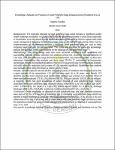| dc.description.abstract | Background: The improper disposal of used polythene bags waste remains a significant public
health challenge worldwide. In Uganda, 53% of solid waste are generated in urban areas especially
in households. Lira City passed a solid waste management ordinance in 2019 to support with solid
waste management including the polythene bags, tried to use enforcement among others but the
implementation of the strategies became a challenge since polythene bags are used as daily
shopping bags, and also for packing food. This study was therefore to assess the knowledge,
attitude and practices of lira city residents on the disposal of used polythene bags.
Methodology: The study design used was cross sectional, employing both qualitative and
quantitative methods of data collection and analysis among 421 randomly selected residents of
Lira City. Data was collected using structured questionnaires, key interview guides via face-face
interviews. Quantitative data analysis was done using STATA 17 summarized as frequencies,
percentages, means and standard deviations. Pearson Chi square test was run for bivariate analysis,
and odds ratios for regression and p-value of 0.05 reported significant. Qualitative data analysis
was manually done using the Braun & Clarke (2016) 6 steps.
Results: Overall response rate was 99.8%. disposal practices of residents were improper at 52.5%,
a good number of the respondents, 179 (42.5%) were aged 18 to 28 years, were female 273
(64.9%), and the most common level of education attained was primary 147 (34.9%). Most of
them were self-employed 173 (41.1%), married 285 (61.3%), and catholic 165 (35.2%) by religion.
A majority, 78.9% had good knowledge of proper disposal of used polythene bags. Factors
associated with used polythene bags disposal among residents in Lira City include age (aOR;
3.007, 1.074-8.417), sex (aOR; 1.2, 0.82-1.97), reduce injuries (aOR; 1.2, 0.38-4.15), drainage
blockage (aOR; 3.04, 2.00-4.63), and human health problems (aOR; 1.7, 1.15-2.73).
Conclusion: Good knowledge on disposal of used polythene bags was high, disposal practices
were poor at 52.5%. KII reported a knowledge gap in managing used polythene bags which has
become a major challenge in Lira City. “the waste management practices of the people in the peri
urban areas of the city is very poor and it’s even worse with used polythene bags, and there is need
for awareness creation on general waste management with emphasis on disposal of used polythene
bags” KI-1 said.
Key words: Knowledge, Attitude, Practices, Polythene Bags, Disposal, and Residents of Lira City | en_US |

